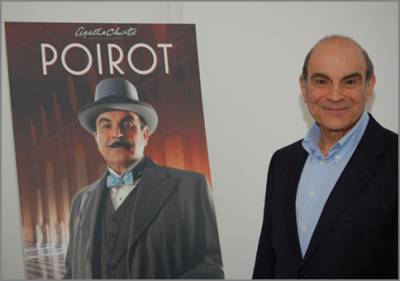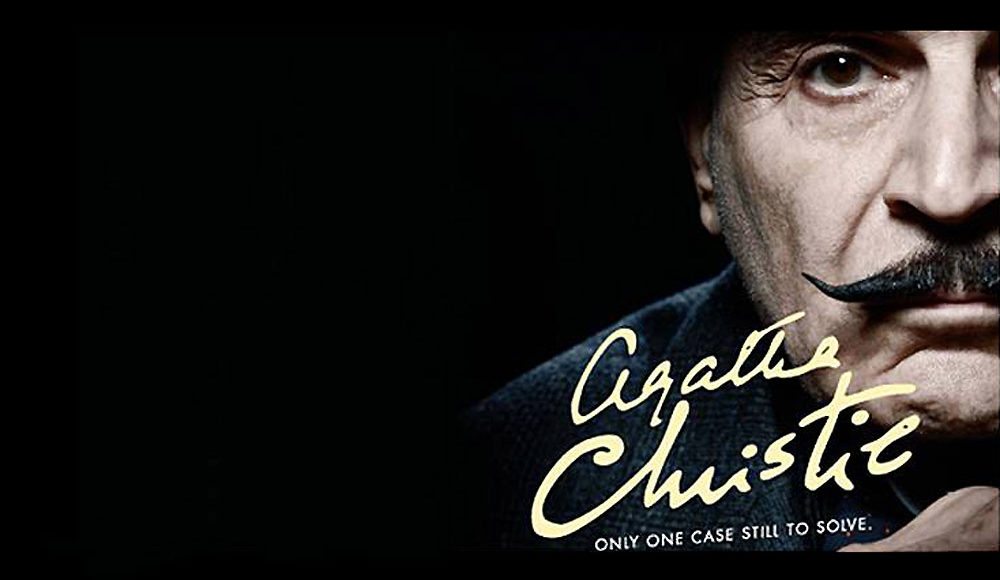There were Poirots before him. There will be Poirots to follow. Right now, for over seven hundred and fifty million plus viewers who have watched the detective series since its debut in 1989, David Suchet is Poirot. Poirot is David Suchet.
Moments following a screening of Curtain: Poirot’s Last Case, at the Paley Center in Beverly Hills last June, a casually dapper Suchet strode on to the stage, for a Q&A led by Robert Lloyd of the Los Angeles Times. The classically trained thespian felt present—in his skin—in the best sense of the word.
(More on Agatha Christie’s Poirot, Season 13)
He quickly disarmed the audience with a relaxed greeting and an infectious warmth and spoke about the process he used when first creating the all-seeing, all-knowing mustachioed sleuth:
“The worse thing that I can do as an actor is to say “How shall I play this role?” … That can lead to misinterpretation because you’ll be doing what I want. So what I try to do on everything, is what I did with Agatha Christie… I started reading… with a huge notebook to write down every single character detail that I could find. Not to determine how I was going to play him, but just to get to know what she was writing, what eccentricities, how he dressed, what was his past… So having got this dossier then you have to study the personality and use your imagination and use every piece of creativity within oneself to change who I may be to become them rather than to adapt them to be me.”
“I worked on his dress sense… on how he looked… on the padding underneath to give me the shape that Agatha Christie had designed for him with his head slightly forward, tilted to one side ‘like a black bird’ she describes him. All these little things, having two eggs exactly the same size for breakfast. And in fact… I started to become his protector… when I started to get directors who wanted to turn him into a comedy—into a two dimensional character—and I just wanted to be the Poirot that Christie wrote. I didn’t want to be jut a comedy cardboard cutout.
“The great thing in the interpretation that I was able to create, was that when I started reading the novels and the short stories I suddenly met a character that I had not seen portrayed. That was my luck, because I love Albie Finney. He’s a great actor and a great Poirot. And I loved Peter Ustinov, Ian Holm, etcetera. But I hadn’t seen the Poirot that Christie wrote.”

Suchet has penned a book about his experiences while playing his literary alter ego: ‘Poirot and Me.’ (Photo by David Nairne)
“So I thought, this is terrific. I’m going to be that. An early thought was that it wouldn’t be as entertaining. In fact when I was interviewed in the Daily Telegraph just before it came out, they asked how did I think it was going to be received and I said: ‘I’m not sure. It may be a bit boring.’
“Because I wasn’t going to be the comic, entertaining figure that, maybe, the audience wanted to see. I wanted to be the Agatha Christie’s Poirot. The Poirot… that her readership would recognize. And they did. They came out of the woodwork and they read it and they said… ‘We’ve found him.’ And that was my method, that’s how I worked on the character.”
Suchet noted that playing the role had made him far more observant than he was used to being and he also picked up another useful trait.
“I was never really a good listener,” Suchet said. “And to listen well is a great-great compliment to whom you’re with, if someone is speaking to you, if they get your ear in totality, it’s enormously complimentary and important. Poirot is one of the greatest listeners. … And I quote: he says, “I listen to what you say but I hear what you mean.”
Suchet went on:
“… to listen well is as tiring as to speak because it’s total attention. That person is the only person in the room. And that’s what Poirot does. And that’s what he taught me. And I’ve got to struggle to hang on to that now I’m not playing him anymore.”
To his good fortune, Suchet was never typecast as Poirot and has continuously worked in all theatrical arenas playing a variety of roles. However, he never knew from one season to the next if there was to be another go round for Le Petit Belge.
“…at the end of every series, I was never optioned. Never, for twenty-five years.” Suchet exclaimed with exuberance. “That’s both a good thing and a bad thing. The good thing about it was that I had gaps, because I thought I had finished. I was able to do Long Day’s Journey. I was able to do All My Sons. I was able to do another television… lots of film—lots of radio, and then I’d get a phone call: ‘Will you do a Poirot?’ Well, uh, yes. But I was never optioned.
“Now … if someone had said at the beginning: We’re going to give you a character and we’re going to option you for twenty-five years… I’d have said no. Because I couldn’t have worked outside it. As a character actor I would have been stuck for a quarter of a century. But the fact that I wasn’t, now looking back, was a gift!”
Curtain airs Monday night, August 25th, on Acorn TV, and is the last of the five episodes making up Poirot’s 13th and final season. Take a peak:
Longtime Hercule Poirot sidekick Hugh Fraser (Captain Hastings) joins Suchet in the finale.
* * *
WARNING—SPOILER ALERT: If you’ve not read the novel nor seen the final episode, you may want to stop reading and return to this after the airing.
How Curtain came to be, as told by David Suchet:
“She (Christie) wrote Mysterious Affair at Stiles in the twenties. Hugely popular. She wrote it as a dare. She wasn’t going to be a novelist. She was a chemist…as a nurse during the first World War. Overnight success. Started to write other novels.
“World War II comes along and anybody could die in World War II in Britain. We were just a place for bombs to drop. And she thought she’d write the last story. Kill him off, so that the readership, if she died, it would round off one of the most popular characters for twenty-odd years.
“So after the war, she was still alive. She gave it to her publisher who refused to publish it. So it stayed undercover. She was ordered to write more. But it got to that point where she actually had to write more and not long before her own death, she was allowed to end (it) and Curtain came out, but it was written, like, thirty-odd years before it was published. Interesting.”
When it came to filming, Suchet requested they tackle Curtain first:
“I can’t help but watch it with great emotion, because he’s my best friend and I get very emotional because this episode, that you’ve seen, is the end. That is it. And…. I just asked for the chance to—of the last five films that we did, I asked if I could film this first and not last, because, I didn’t want to leave him dead. Because I’ve lived with this guy and he’s lived with me for twenty-five years. And even though I’ve done other work and everything in between it’s a twenty-five year relationship and we’ve become incredibly close. It’s a strange thing to say, but we have.
“I know him possibly better than I’ve known anybody else. I didn’t want to leave him after twenty-five years, remember him like that, so we did this one before Christmas and then we worked right through to June. So I packed up with him still very much alive and very much with me.”
Ms. Rosalind Hicks (Agatha Christie’s daughter) once said to Suchet
“I’d like you to know that if my mother were still alive, she would be delighted.”
Curtain: Poirot’s Last Case brings the series to a full stop with a whopping 70 episodes. It debuts Monday, August 25th on Acorn TV where “the little grey cells” of David Suchet’s creation of Agatha Christie’s Poirot will remain alive and available for streaming by fans everywhere. It has been reported that they, too, are delighted.




